As you stroll along the pristine shores of Florida’s breathtaking beaches, the warm sand tickling your toes, you can’t help but marvel at the dazzling array of seashells scattered before you.
The shimmering shells glisten under the radiant sun, beckoning you to reach down and claim them as your own. But before you do, it’s essential to understand the legality of taking shells from the beach.
Florida, a state renowned for its stunning coastline and abundant marine life, has specific laws and regulations in place to protect its delicate ecosystem. By familiarizing yourself with these rules, recognizing the importance of preserving protected species, obtaining a fishing license, and practicing sustainable shell collecting, you can enjoy the freedom of shell collecting responsibly.
So, let’s embark on this enlightening journey together, delving into the intricacies of shell collecting in Florida and ensuring we respect the environment while indulging our passion for these exquisite treasures.
Key Takeaways
- Shell collecting is allowed on most Florida beaches, but taking live shells is prohibited.
- Violating shell collecting regulations in Florida can result in fines and imprisonment.
- Certain shells in Florida are considered endangered species and their collection is strictly regulated.
– Obtaining a fishing license is essential for legal fishing in Florida.
Know the Laws and Regulations
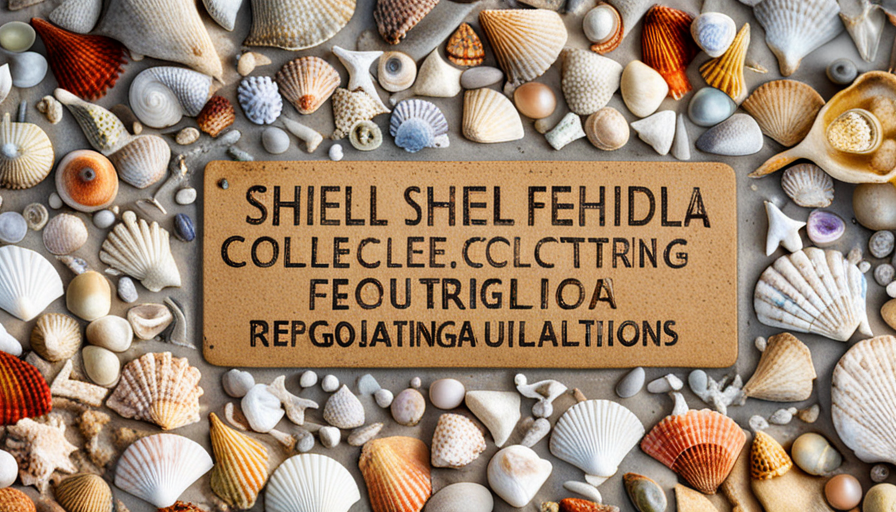
Before you head to the beach, make sure you know the laws and regulations regarding shell collecting in Florida. Understanding local restrictions is crucial to ensure a fun and legal shell collecting experience.
While shell collecting is generally allowed on most Florida beaches, there are certain regulations in place to protect the environment and the wildlife. It’s important to note that taking live shells is strictly prohibited. Live shells are shells that still have a living organism inside. These shells are home to various marine life, and removing them can disrupt the delicate balance of the ecosystem. Therefore, it’s essential to only collect empty shells.
Violating the shell collecting regulations can have serious consequences. In Florida, the penalties for illegal shell collecting can include fines and even imprisonment. The exact consequences may vary depending on the severity of the violation and the specific location.
To avoid any legal issues, it’s recommended to familiarize yourself with the specific regulations of the beach you plan to visit. Many beaches have signs or information boards that provide guidelines for shell collecting. Additionally, consulting with local authorities or park rangers can also provide valuable information.
By understanding the local restrictions and consequences of illegal shell collecting, you can enjoy a relaxing and lawful experience while preserving the beauty of Florida’s beaches. Remember, respecting the environment and following the rules ensures that future generations can also enjoy the wonders of shell collecting.
Understand Protected Species
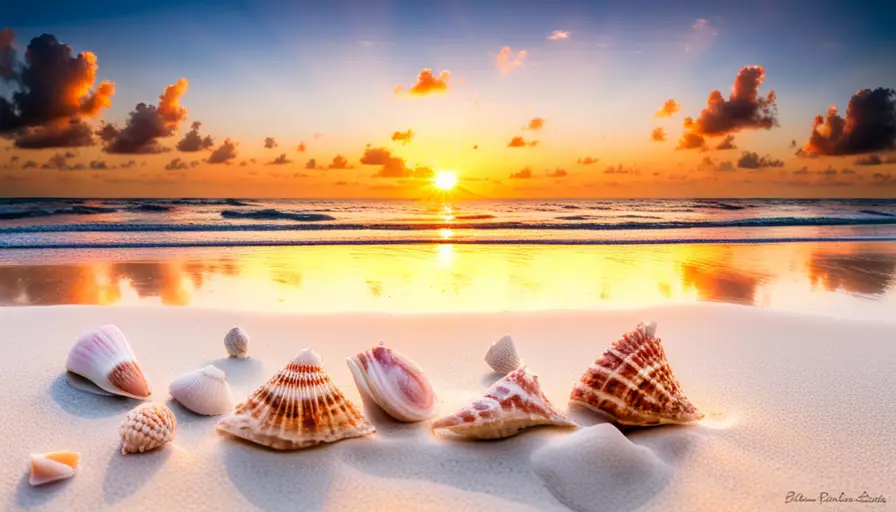
Wow, did you know that there are some species of shells in Florida that are so protected, you’d practically need a permit just to look at them?!
It may come as a surprise, but certain shells are considered endangered species, and their collection is strictly regulated. Florida is home to a diverse range of shell species, including the Queen Conch and the Junonia. These shells are not only beautiful, but they also play a critical role in the ecosystem.
Due to their significance, conservation efforts have been put in place to protect these species from overharvesting and habitat destruction. The Florida Fish and Wildlife Conservation Commission (FWC) has implemented strict regulations to ensure the survival of these endangered shells.
It is important to be aware of these regulations and to respect the laws governing shell collecting in Florida. By understanding and abiding by the rules, we can contribute to the conservation efforts aimed at preserving these precious shells for future generations to enjoy.
So, next time you visit the beach, take a moment to appreciate the beauty of these protected species, and remember to leave them where you found them.
Obtain a Fishing License
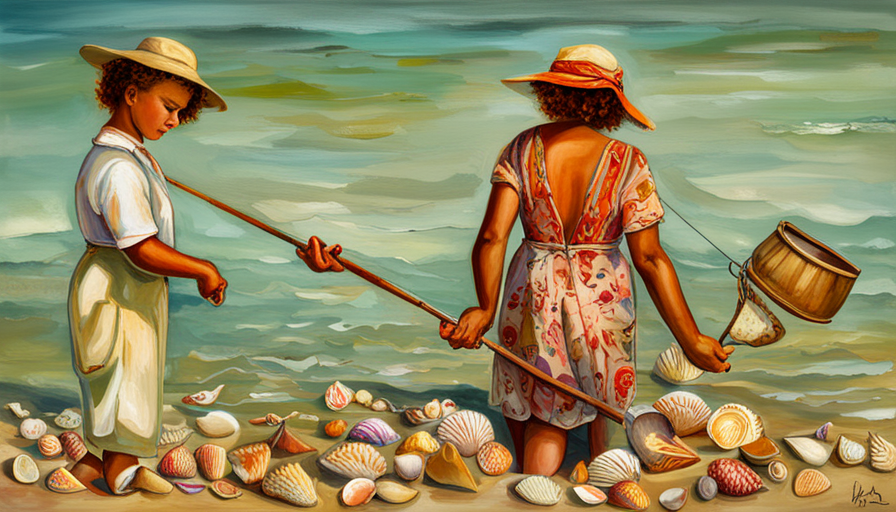
Obtaining a fishing license is essential for any angler looking to cast their lines and reel in some prized catches. Fishing regulations in Florida are in place to ensure the sustainability of fish populations and protect the aquatic ecosystem.
To fish legally in Florida, you must obtain a fishing permit, also known as a fishing license. This license allows you to fish recreationally in both freshwater and saltwater bodies within the state.
The Florida Fish and Wildlife Conservation Commission (FWC) is responsible for regulating fishing activities and issuing fishing licenses. They offer various types of licenses, including annual, 7-day, and 3-day licenses, depending on the duration of your fishing trip. The fees for these licenses vary, and the revenue generated from fishing licenses is used for conservation efforts and fishery management.
To obtain a fishing license, you can visit the FWC website or go to a local tax collector’s office, sporting goods store, or bait and tackle shop. You’ll need to provide some personal information, such as your name, address, and date of birth. Additionally, you may be required to show proof of residency if you’re a Florida resident.
By obtaining a fishing license, you’re not only ensuring that you’re fishing legally but also contributing to the conservation and management of Florida’s fish populations. So, grab your fishing gear, get your fishing license, and enjoy the freedom of casting your line in the beautiful waters of Florida.
Respect the Environment
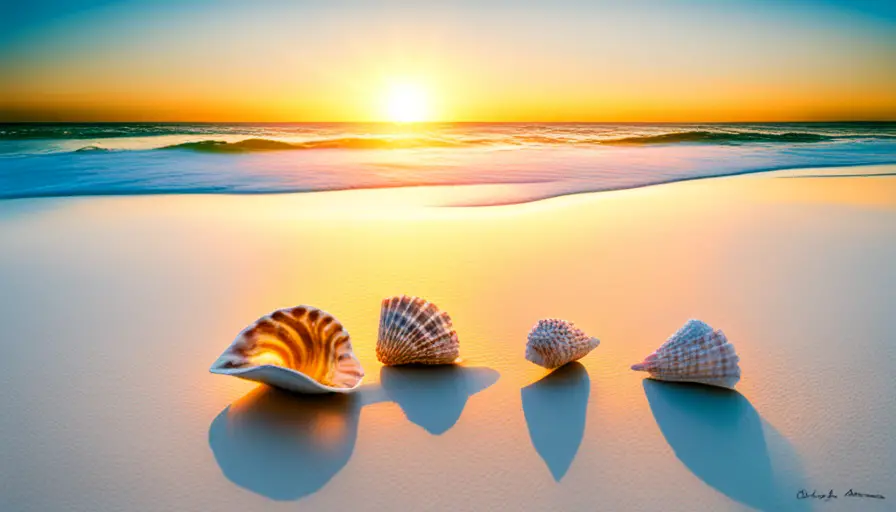
Respecting the environment means acknowledging that the ocean is just a dumping ground for all our trash, right? Wrong.
In fact, it is crucial that we recognize the importance of the ocean and its delicate ecosystem. When it comes to shell collecting in Florida, it is essential to understand the significance of sustainable tourism and conservation efforts.
Sustainable tourism is a practice that aims to minimize the negative impact on the environment while promoting economic growth and preserving cultural heritage. By adhering to sustainable tourism practices, we can ensure that future generations will also be able to enjoy the beauty of Florida’s beaches and the thrill of shell collecting.
Conservation efforts play a crucial role in maintaining the health of the ocean and its inhabitants. Florida’s coastal ecosystems are home to a diverse range of species, many of which rely on shells for protection and habitat. By respecting the environment and refraining from taking live shells or disturbing the natural balance, we can help preserve these fragile ecosystems for future generations.
So, as you venture out to collect shells along Florida’s pristine beaches, remember to be mindful of the environment. Take only the empty shells, leave behind any live shells or organisms, and be sure to dispose of any trash properly. By doing so, you can contribute to the sustainable tourism and conservation efforts that are vital to preserving the beauty and diversity of Florida’s coastal ecosystems.
Practice Sustainable Shell Collecting
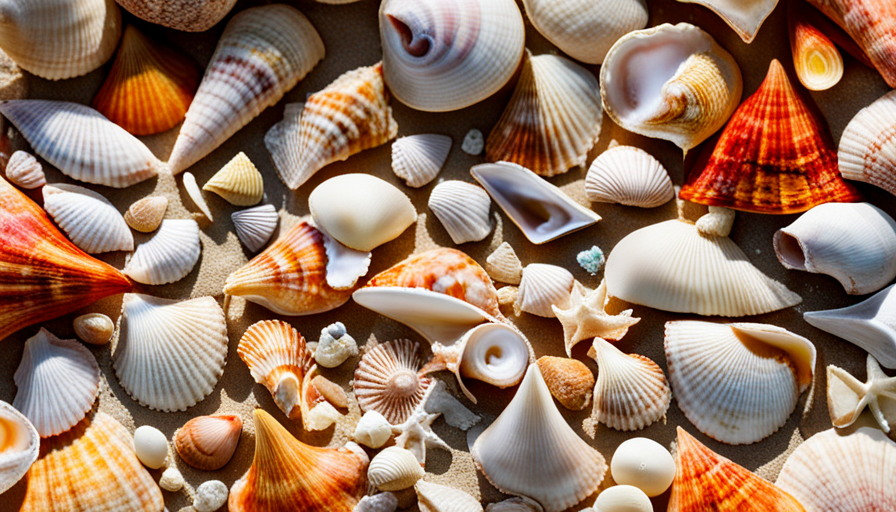
As you stroll along the sandy shoreline, picture yourself as a treasure hunter, seeking out the hidden gems that nature has gracefully left behind. Shell collecting in Florida can be an exciting and enjoyable activity, but it is important to practice sustainable methods to ensure the preservation of these natural treasures.
When engaging in shell collecting, it is crucial to be mindful of ethical harvesting practices. This means taking only what you need and leaving behind the rest. By doing so, you contribute to the conservation efforts that aim to protect the delicate balance of marine ecosystems.
To further emphasize the significance of sustainable shell collecting, let’s take a look at the following table:
| Ethical Harvesting Practices | Conservation Efforts |
|---|---|
| Take only what you need | Protecting habitats |
| Avoid collecting live shells | Preserving biodiversity |
| Respect protected areas | Reducing environmental impact |
Adhering to these guidelines ensures the continuation of shell collecting for future generations. By practicing sustainable methods, you can enjoy the beauty of the beach while also contributing to the preservation of our natural resources.
Remember, the freedom to explore and enjoy the beach comes with the responsibility to protect and conserve its treasures. So, as you embark on your shell collecting journey, keep in mind the importance of ethical harvesting and conservation efforts.
Leave Live Shells on the Beach
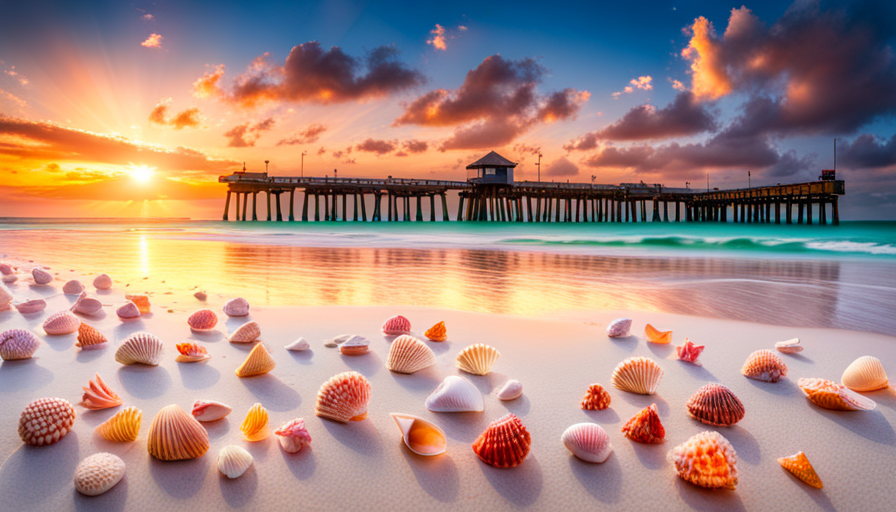
When you’re at the beach, remember to leave live shells where you find them, as they play a vital role in the ecosystem, contributing to the overall biodiversity of the area. Leaving marine life undisturbed ensures the ecological balance is maintained.
Live shells, such as those inhabited by mollusks and other organisms, are not just empty shells. They’re home to a variety of marine creatures, providing shelter and protection from predators.
Taking live shells from the beach can have a significant ecological impact. It disrupts the natural cycle of the ecosystem and can lead to a decline in population numbers of certain species. Removing live shells disrupts the natural balance and can have serious consequences for the overall health of the beach ecosystem.
By leaving live shells on the beach, you’re allowing these creatures to continue their important role in the ecosystem. They help to filter water, recycle nutrients, and provide food for other organisms. Additionally, live shells contribute to the beauty of the beach, creating a natural and vibrant habitat for all to enjoy.
So, next time you visit the beach, remember to appreciate the beauty of live shells but resist the temptation to take them home. By leaving them where you find them, you’re contributing to the preservation of the beach ecosystem and ensuring its long-term health and sustainability.
Enjoy Your Shell Collecting Experience Responsibly
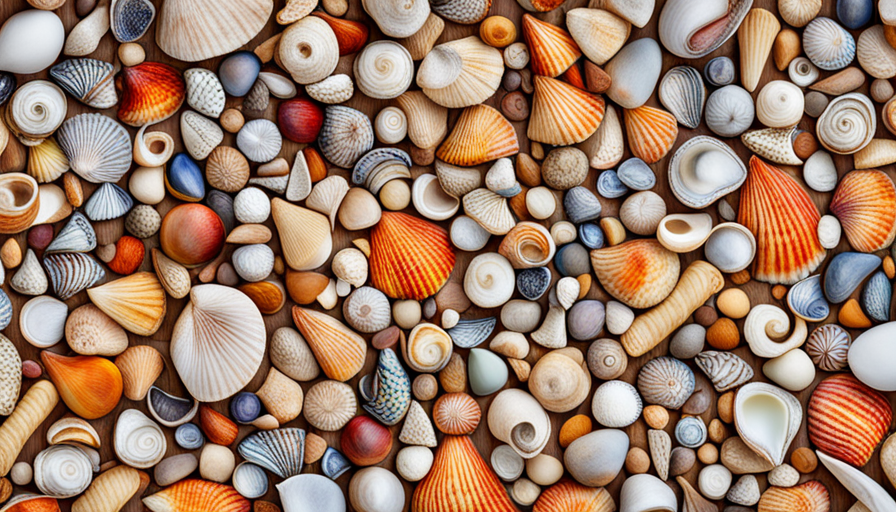
Enjoy your shell-hunting adventure responsibly by exploring the sandy shores with curiosity and an appreciation for the wonders of nature. As you indulge in the thrill of discovering beautiful seashells, it’s important to be mindful of ethical considerations and practice proper handling techniques. Here are four key points to keep in mind:
- Leave no trace: When collecting shells, avoid disturbing the surrounding ecosystem. Refrain from taking live shells or any shells that might serve as habitats for marine organisms. Remember, we’re merely visitors in their natural habitat.
- Respect local regulations: Different beaches may have specific rules regarding shell collecting. Be sure to familiarize yourself with these regulations to avoid any legal issues. These guidelines are in place to protect the fragile balance of the beach environment.
- Handle shells with care: Shells are delicate and can easily break. When picking up shells, avoid applying excessive pressure or dropping them. Carefully examine and appreciate their intricate patterns and shapes without causing any harm.
- Educate yourself: Take the time to learn about the different species of shells you encounter. Understanding their importance in the ecosystem and their role in the overall health of the beach will deepen your appreciation for these natural treasures.
By following these guidelines and treating the beach and its inhabitants with respect, you can enjoy your shell collecting experience while ensuring the preservation and sustainability of this unique coastal ecosystem.
Frequently Asked Questions
Can I collect shells from any beach in Florida?
You can collect shells from many beaches in Florida, but some of the best beaches for shell collecting include Sanibel Island, Captiva Island, and Siesta Key. Remember to follow tips for responsible shell collecting to preserve the natural beauty of these beaches.
Are there any restrictions on the number of shells I can collect?
Yes, there are number restrictions on the amount of shells you can collect in Florida. However, as long as you abide by the rules and regulations, you can still enjoy the freedom of collecting shells of various sizes.
Is it legal to collect shells from state parks in Florida?
Yes, it is legal to collect shells from state parks in Florida. However, it is important to be mindful of the effect of shell collecting on local ecosystems and to support conservation efforts to protect Florida’s shell resources.
Are there specific seasons or times when shell collecting is prohibited?
Prohibited shell collecting times and seasons in Florida are regulated to protect the environment. It is important to be aware of shell collecting regulations to ensure you are in compliance with the law.
Can I sell the shells I collect from the beach?
You’ll be surprised to know that over 10,000 shells were sold on online marketplaces last year. While selling shells is legal in Florida, it’s important to consider ethical concerns surrounding shell collecting.
Conclusion
In conclusion, when it comes to shell collecting in Florida, it’s crucial to understand and abide by the laws and regulations in place. By obtaining a fishing license and being aware of protected species, you can ensure that your shell collecting activities are legal and responsible.
Remember to respect the environment and practice sustainable collecting methods. Leave live shells on the beach to preserve the ecosystem. By following these guidelines, you can enjoy a fulfilling and responsible shell collecting experience in the beautiful beaches of Florida.

